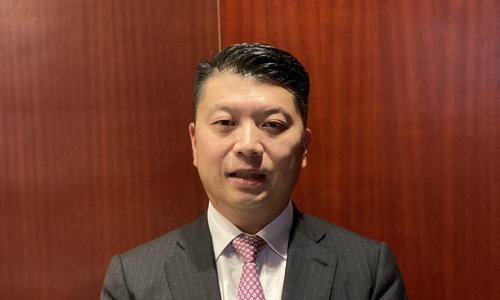HOME >> SOURCE,SPECIAL-COVERAGE
Macao, HK must seek complementary path
Source:Global Times Published: 2019/12/19 21:03:40

Kevin Ho King Lun Photo: Li Qiaoyi/GT
Editor's Note:As Macao Special Administrative Region (SAR) celebrates the 20th anniversary of its return to China, local businesspeople who have benefited tremendously from the SAR's ever-closer ties with the Chinese mainland are mulling over efforts to push the city toward becoming a greater part of the Chinese economy.
In an exclusive interview with the Global Times reporter Li Qiaoyi (GT) on Monday, Kevin Ho King Lun, president of the Industry and Commerce Association of Macau (INCA) and a Macao deputy to the National People's Congress, the nation's top legislature, noted that the "one country, two systems" policy has underpinned the city's economic rise. But more must be done to energize the local economy and strengthen relations between Hong Kong and Macao to bring out the best in the two SARs, which are seen as bringing more vitality to the national economy.
GT: How could Macao become the engine for regional development?
Ho: Macao is a key member of the Guangdong-Hong Kong-Macao Greater Bay Area and one of the only two SARs.
Though we are small in size, we have hefty fiscal reserves of about 600 billion Macao pataca ($74.78 billion), which is enough for Macao to last for six years without revenue.
With this solid foundation, we can explore new opportunities to fit in whole country's development strategy, such as financial industry and how to better support the yuan internationalization. We also devoted to technology innovation, where we are lagging behind. With our resource, we could attract more talents. We can do good things with our resources and talents.
GT: As an important conjunction along the Belt and Road routes, how can Macao make contribution to better connect with Portuguese-speaking countries in terms of financial connectivity?
Ho: In several centuries of Macao's history, the city acts as an intermediary, providing platform between buyers and sellers
There are barriers for private companies and small companies to develop overseas. But Macao can be a springboard for companies before they go overseas especially to Portuguese-speaking countries which contain eight countries and 250 million people.
There is a huge opportunity for Macao in the future. Instead of being a transit to Portuguese-speaking countries, the city can also be a path to the EU through Portugal.
GT: What pressing issues should Macao address first in future development?
Ho: The legal system in Macao is lagging behind. One prominent problem is that some places do not have law to abide by. The new chief executive of Macao is very experienced in legal system construction. The officials in the new administration are very pragmatic. They should be more efficient and expedite legal system reform.
Securities laws should be drafted. We have large fiscal reserves. But due to our lack of laws on investment fund, we have to let mutual fund companies in Hong Kong run our reserves. People in Macao save their money in Hong Kong. If we cannot open at least mutual fund companies, how can we develop a financial industry? So building a solid legal system is a priority.
GT: How to reinforce the connection between Hong Kong and Macao? What interaction pattern shall we expect between the two cities?
Ho: Hong Kong and Macao are both special administrative regions with autonomous rights. The two local governments have to gradually push forward the cooperation which was not sufficient.
I hope local governments of Hong Kong and Macao could have more communications and collaborations. The collaboration between Zhuhai and Macao has made headways. But there are still some barriers between Hong Kong and Macao. If we can have breakthrough, we could jointly develop a large market.
People in Macao rarely try to compete with someone. We follow our own path. Though Macao economy grows well, it is still a small city. We don't need to compete with Hong Kong. We need to do the best for ourselves, play our role in the Greater Bay Area, as our advantages complement each other. There is always space for the two cities to complete, tolerate and give each other. This way, the Greater Bay Area could qualify as first class in the world.
GT: The unrest in Hong Kong has generated a negative impact on the local economy. What do you think of this situation?
Ho: I own a chain restaurant in Hong Kong. Our sales in the past six months have dropped around 35 percent. I believe other restaurants have a similar situation.
The environment has changed - tourists are afraid of coming to Hong Kong and local residents fears to go out. Many people would rather spend Christmas in Macao.
If the situation continues, I believe there will be a wave of bankruptcy.
Posted in: INSIDER'S EYE,FEATURE 2